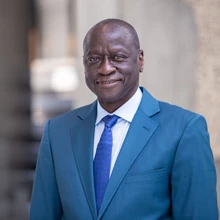 Isatu Bah vaccinates her 5-week-old son, Mohamed Kamara, at the Ola During Children's Hospital in Freetown, Sierra Leone. Photo credit: Dominic Chavez/World Bank
Isatu Bah vaccinates her 5-week-old son, Mohamed Kamara, at the Ola During Children's Hospital in Freetown, Sierra Leone. Photo credit: Dominic Chavez/World Bank
As leaders from across African governments, the private sector, civil society, and international development partners gather this week in Japan for the ninth Tokyo International Conference on African Development (TICAD), it’s encouraging to see health taking a prominent place on the agenda.
This reflects that Universal Health Coverage (UHC), the principle that all people should have access to quality health and nutrition services without financial hardship, is a human imperative. UHC means ensuring that a mother can give birth safely in a health facility, that a child can survive a preventable illness, that a worker can stay productive in their job, and that no family is forced to choose between buying food and affording lifesaving medicine.
Investing in health and nutrition to support a rising generation
The West and Central Africa region has one of the world’s youngest and fastest-growing populations. Over the next 25 years, more than 200 million children will be born, adding to the current population of 534 million. By 2050, nearly one in five of the world’s youth will live in this region. These young people hold immense promise to drive Africa’s economic future. But achieving this potential requires sustained investment in human capital, starting with health and nutrition from the earliest stages of life, which are critical for better learning, skills development, and productivity.
Health is also crucial for creating and maintaining jobs, both today and tomorrow. Universal access to quality health systems creates employment opportunities and boosts productivity. There is the potential for an additional 1.4 million skilled health worker jobs in West and Central Africa, along with another 800,000 community health workers. Moreover, scaling up African manufacturing of pharmaceuticals and other medical products would spur job creation, enhance skills development, and help reverse brain drain. Healthy workers also lead to higher labor productivity. A survey from Ghana showed that almost 40 percent of lost working days are due to malaria.
The importance of resilient health systems
We cannot speak about health without also addressing resilience, which is critical to saving lives, safeguarding development gains, and sustaining public trust in institutions. Recent health emergencies, such as COVID-19, Ebola and others, have underscored the urgent need for health systems that can deliver routine care while also preventing, detecting, and responding effectively to crises.
Over the past decade, I have witnessed firsthand the strong commitment of our countries to improve resilience as well as health and nutrition outcomes. Nigeria is investing in primary health care and fostering cross-sector collaboration to strengthen the quality and coverage of health services. Côte d’Ivoire is scaling up its National Health Insurance program and leveraging public-private partnerships to boost laboratory and medical imaging capacities. Ghana is advancing health financing reforms through its National Health Insurance scheme and integrated care delivery. Meanwhile, the Central African Republic, Burkina Faso, Mali, and Mauritania are using performance-based financing, where payments are conditional on results, to improve health outcomes. Across the continent, countries like Madagascar and Senegal stand out as leaders in reducing child malnutrition, offering valuable lessons for others.
Yet, significant challenges remain. Too many people still lack access to quality, essential health services and the region continues to face heightened risks from pandemics, climate shocks, food and nutritional insecurity, and conflict. Government spending on health remains low compared to other regions and is far short of the Abuja target of 15 percent of the national budget. At the same time, development assistance for health is declining as partners shift priorities, making it more urgent than ever to mobilize domestic resources and use existing funds more efficiently.
Partnering to advance quality health services
In the face of these challenges, the World Bank is committed to supporting countries to deliver quality, affordable health and nutrition services to 1.5 billion people worldwide by 2030, including 200 million in West and Central Africa. In partnership with the Government of Japan and the World Health Organization (WHO), we are also helping countries globally to develop National Health Compacts. These compacts outline each country’s vision, priority reforms, and financing needs for UHC.
In June 2025, we developed a new regional health strategy focused on three priorities: Frontlines First—delivering a quality package of health and nutrition services at the primary and community levels; Fixing Finance—spending better and more on health; and Future Fit—building resilient health systems that can withstand vulnerabilities. The World Bank Group is also gearing up to support the expansion of medical manufacturing in Africa.
Our partnership with the Government of Japan has been especially impactful. Japan’s leadership on UHC has helped mobilize resources, foster knowledge, and build solidarity. The Japan UHC Knowledge Hub, developed in coordination with the World Bank and WHO, is a valuable platform for knowledge sharing and capacity building among health and finance authorities worldwide, with a particular focus on Africa.
Achieving UHC in our region will take time. But with political will, smart financing, innovation, and unwavering commitment, it is within reach. The World Bank will remain a trusted partner in this effort, firmly believing that everyone, everywhere, deserves a healthy and dignified life.


Join the Conversation